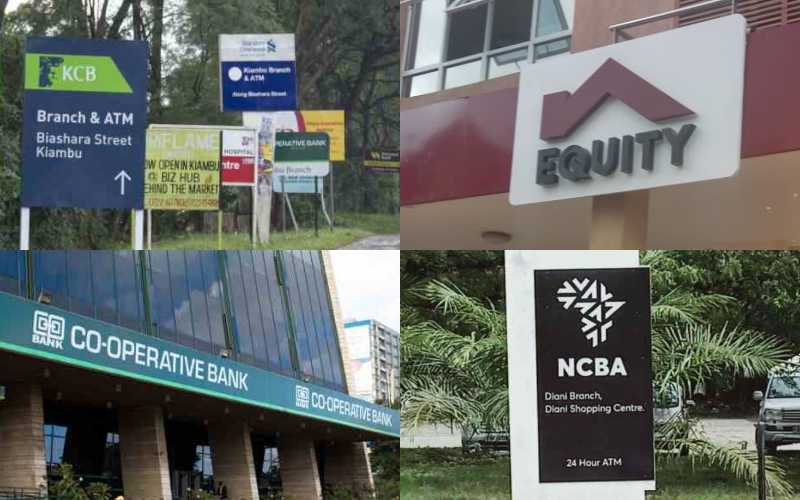Banks
60% of Small Firms Unable to Repay Their Loans

By the end of June, six out of ten micro and small businesses (MSEs) had defaulted on their loans, illustrating the challenging business climate caused by an increase in interest rates and the cost of products and services.
According to a new study of the MSE Tracker Survey, which measures financial inclusion among small enterprises and was released by the Central Bank of Kenya (CBK) and other partners, 60.7 percent of small businesses had defaulted on their loans in June of this year, up from 42.8 percent in October 2022.
Small business default rates were significantly higher than those in the banking industry as a whole, where non-performing loans as a percentage of gross loans increased from 13.8 percent to 14.47 percent during the assessment period.
This suggests that those who need more money may be obliged to withdraw from their savings, cut back on family expenses, or take out a new loan to pay off previous debt.
The majority of firms in Kenya’s highly unregulated economy are owner-operated, and their default rates rose steepest, from 35% in October of last year to 63% in June.
Poor sales, high inflation, and an increase in interest rates are just a few of the economic challenges that the majority of businesses are currently facing. These factors have lowered their cash flow and forced many who were servicing loans into default.
According to the survey, which was conducted jointly by the CBK, the Kenya National Bureau of Statistics (KNBS), and the Financial Sector Deepening (FSD) Kenya, small business owners took out loans to address a variety of issues, including unstable cash flows brought on by high operating costs.
“To counter this, MSEs take loans to remain afloat. However, with persistent harsh economic conditions, these businesses tend to default on their loans by either paying late, miss a payment or pay less than expected,” reads part of the survey.“The survey results indicate that 60.7 percent of MSEs defaulted on their loans in June 2023 compared to 42.8 percent in October 2022.”
The current administration, which has made it a priority to empower people and small enterprises by facilitating their access to credit at reasonable rates through a State-backed financial inclusion fund widely known as the Hustler Fund, is going to need to step in to address this situation.
The majority of MSEs are unable to access the official credit market, and many of them turn to pricey digital lenders who impose outrageous interest rates.
About 45% of the respondents who said they had open loans at the time of the poll had taken out loans from Hustler Fund, demonstrating the popularity of the State-backed mobile lending service.
Another 28% of those surveyed took out loans using mobile banking services like M-Shwari and KCB M-Pesa, and another 23.7% borrowed money from chamas or groups.
Market participants claim there are signs that the borrowers are juggling their borrowings and using the government microloans to pay off other digital debt.
In an interview, John Gachora, the CEO of NCBA Group, which jointly runs M-Shwari with Safaricom and KCB Group, noted that these mobile lending platforms’ payback ratios have been favorable.
“Repayment has been very good…And some of it we actually believe is from the Hustler Fund,” said Mr Gachora.
While the Hustler Fund’s popularity has grown, it has not come without its share of difficulties; 29 percent of outstanding loans, or about Sh3 billion, are not being serviced according to the planned schedule.
The Hustler Fund’s borrowers are making payment defaults at a higher rate than those at commercial banks, saccos, and microfinance institutions, indicating a moral hazard that is typical of State-backed financing initiatives.
Women have been struck the hardest by reduced cash flows more than males, as seen by the high default rate (62.3%) among female-owned firms.
55 percent of female borrowers had defaulted by October of last year. Male default rates decreased during the review period, going from 45 to 58.6 percent.
Businesses with fewer than one employee saw a rise in default rates, whereas those with ten or more employees saw a decrease.
Due to their fragile balance sheets, small firms are sometimes the first to fold in times of economic crises, such as the Covid-19 epidemic.
In October of last year, inflation—a measure of the increase in prices over a year—rose to a five-year high of 9.6 percent, causing the CBK to raise its benchmark lending rate to commercial banks.
In response, banks had to increase their lending rates, which caused some borrowers—particularly those with variable-interest loans—to default.
Consumer price growth since then has averaged 7.3%, which is within the CBK’s goal range of between 2.5 and 7.5 percent, as inflation has subsequently started to decline.











